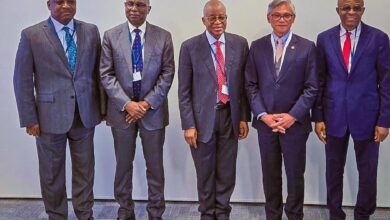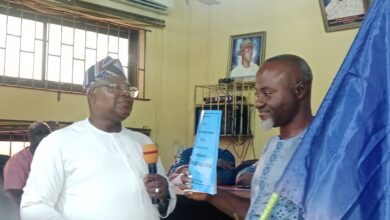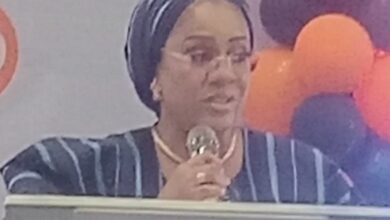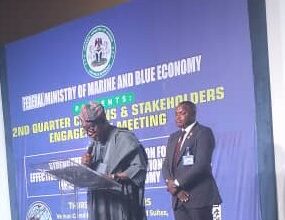Maritime
INTERVIEW: Shipping is about competency and proficiency and not license – Capt. Umoren
INTERVIEW: Shipping is about competency and proficiency and not license - Capt. Umoren

Captain Sunday Umoren is the Secretary General of Abuja Memorandum of Understanding (MoU) on Ports State Security Control in West and Central Africa.
In this explosive and revealing interview, he spoke on variety of issues in the maritime industry and the prospects for maritime students.
He stated that seafarers with the highest license without sea-time amounts to nothing. He added that anyone with the highest license who fails a test, stands no ground saying if there are two or three of such a person in a country, the country is blacklisted.
He also spoke on the relevance of his organisation (Abuja MoU) saying its primary objective is to ensure that no substandard vessel plies the waters, among other issues. Read and be educated.
Excerpts:
How do the operations of the Abuja MoU relate to “Job Creation To Nigerian Youths Through The Maritime Sector,” the theme of the day’s conference?
The Abuja Memorandum of Understanding on Ports State Security Control in West and Central Africa. (Abuja MoU) is one of the nine MoUs in the world. The primary objective of the regime is to ensure that no substandard vessels, no unseaworthy vessels ply the waters. When you talk of substandard vessels, what makes a ship unseaworthy? The construction, the equipment, the crewing, that is the skilled workers.
So, what we are doing here today is strongly related to our own functions. If you don’t have competent crew onboard a vessel, the vessel is actually adjudged unseaworthy. The day’s business has a strong component of what we do.
How can we tap into opportunities in the maritime sector to create jobs to address the ravaging youths unemployment?
It actually starts from the country having a maritime strategy. What is your strategy? From the maritime clusters presented, you see a sector where a lot of opportunities abound. For a country, it is a question of looking at it to say which range in these sectors can I create my needs? Am I going to go into maritime education?
Now, you go back yo your gap analysis: where am I today? Where’s the destination? What do I need to do to bridge the gap, to move from where I am to that enviable position? So, when you do the gap analysis, you’ll work towards closing the gap. Shipping is about competency and proficiency and not what you hold. You can hold the highest license but you dare not come until you are put to test. If you fail, you’re finished! Two, three or four of such from a particular country, you’re blacklisted. So, quality maritime education is key.
Countries must look at skills acquisition and job availability.
But sometimes you ask yourself, if there are no jobs, can you actually acquire skills? That’s where partnership comes in. If we are good at maritime education but don’t have ships, for instance, we may probably have an agreement with some other countries that have ships. That’s what NIMASA is doing, sending NSDP cadets to other countries that have ships to go and have that practical experience because that is a key aspect of the training.
You must sit down, have it as a policy to say this is actually what we want. You design your roadmap towards the actualization. Once you do that, the sky is your limit.
In your presentation today, you spoke on job creation and maritime clusters. Can you elaborate?
I actually used maritime cluster which depicts all the available job opportunities in the maritime sector packaged into a wrap. We moved on to highlight the responsibilities because when you talk about job creation, different stakeholders have different responsibilities, starting from the government. Is the environment business- friendly? The responsibility of the government in respect to fiscal policies and all other related policies, such that vessels can come in.
On the issue of global shipping, are we going to have waters that are pirates infested?
Then, we move on from there to the stakeholders, investors themselves, what they need to do, the part they need to play in job creation. Then to the populace, the students, the cadets. Yes, there may be job opportunities but have you acquired the training, the skills? Have you acquired enough skills to be marketable? We have gone through all the stakeholders and their respective responsibilities such that if all persons fulfill their respective roles, there will be job opportunities and enough human capital to feed on.
So, the bottom line is skill acquisition. You have to do your analysis to determine areas you need to create skills and how to pass such skills to individuals.
When you talk about maritime, yes, you have maritime institutions. But are they accredited? If they are not accredited by the regulatory authorities, students will end up wasting their own time, finishing and coming out without being adjudged to be fit to be certificated. How are they recognized? Accreditation of maritime schools.
Do you think our system is achieving what is expected in addition to issues of security on the waterways?
Accreditation is a process. When you come to maritime, let us look specifically at seafaring. There are clear guidelines on accreditation. Like with NIMASA, all maritime administrations should have what we call quality assurance department to come up with the rules and standards we need to meet, what we actually call minimum standards. The International Maritime Organization (IMO) sets the minimum standards. But every flag state, every country can build up to be IMO standards + ++, depending on what you want. The higher you go above the IMO standards, the better for you because it is a universal thing in the shipping industry.
Your licences and certificates. How are they recognized? Is your country on the IMO White List? Have you been audited by the IMO on what we call the IMSAS audit? Those are the things that really help in the marketing of seafarers.
Quality standards is key. We have some conventions that clearly highlight what competency and proficiency level every cadet should achieve before being certificated as officer.






